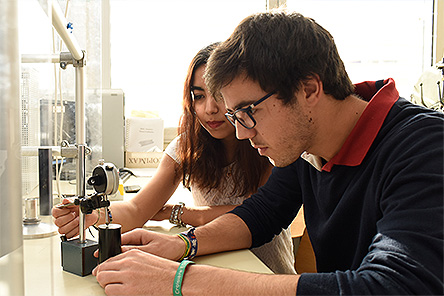Sciences and Techniques for Engineers
Proficiency in science and technology is the goal of our course, which teaches a core syllabus for the first two years so as to equip future engineering students with the necessary fundamentals for continuing their studies in the specialities on offer at the INSA Centre Val de Loire.

© INSA CVL
Objective of the 1st cycle
Provide training on the basis of 5 fundamental objectives:
- Fully grasp the subject areas and learn the fundamental methods;
- Hone speaking and writing skills, in French and other languages;
- Provide initial international and practical work experience;
- Foster personal development, curiosity, critical thinking, showing initiative, independence and teamwork skills;
- Prepare the professional specialisation of future engineers by offering them customised introductory modules (Year 1), followed by pre-specialisation paths (Year 2)
Year 1 spent by all students on the blois campus
The institutes of the INSA Group have chosen to harmonise Year 1of the engineering degree in an effort to bring the various courses into line and to pool teaching practices.
This common foundation accounts for 75% of all modules and results in:
- A 1st year split into semesters to firmly establish the technical and scientific fundamentals;
- Reference works for each subject and the production of works and/or digital resources by the INSA Group;
- A major proportion of practical work for putting knowledge and skills into practice (15% of teaching time);
- Significant training in the human and social sciences in Year 1 (20% to 25%): Sports & Exercise and 1st modern language compulsory, 2nd modern language depending on the student’s aspirations;
- Awareness of the workplace and particularly SMEs, as well as the issue of innovation and its stakes;
- Independent working among students is encouraged by tailored teaching and limited classroom time each week (28h/week on average);
- Clubs and societies accessible from Year 1;
- Professional guidance for everyone, and on an individual basis for some students;
- Compulsory initial work placement at the end of Year 1 (4 weeks).
Course encompasses 3 broad subject areas
- Basic sciences:
mathematics;
IT;
physical sciences. - Applied sciences:
industrial sciences;
practicals. - Humanities:
languages (2 languages compulsory);
human, economic, legal and social sciences;
sport and physical education.

Organisation
- Semesters 1 & 2: core syllabus teaching;
- Semesters 3 & 4: teaching of the core syllabus and pre-specialisation to choose the modules on offer in 3 speciality departments; the final choice is made at the end of semester 4.
Year 1 (Blois campus)
- A supervised project gets students thinking about their career aspirations and helps them to begin progressing towards their chosen training speciality.
- Second language compulsory.
Year 2 (Bourges or Blois campus)
- Assistance with personal and professional development;
- Second language compulsory.
Marking and juries
Continuous assessment of theoretical knowledge means that students' progress can be monitored and anyone who is struggling can be given support.
- an educational report is drawn up every semester to detect any difficulties;
- he jury meets at the end of each academic year to decide whether students can progress into the year above, or at the end of the repeat/resit session.
During the 1st cycle, a student may only repeat one year. In this case s/he must retake the modules that s/he did not pass the first time.
Allocation of students during pre-specialisation in Year 2 or a speciality in Year 3 depends on the following criteria:
- the student’s wishes;
- the student’s ranking in relation to the general average mark of Year 1 for pre-specialisation and of Year 2 for a speciality;
- the number of places set aside for each speciality.
Find out the 4 specialities of the engineering course:
- Industrial Risk Control department (MRI) ;
- Information Technology and Cybersecurity department (STI) ;
- Industrial Systems Engineering department (GSI) ;
- Energy, Risks and the Environment department (ERE), apprenticeship course.

